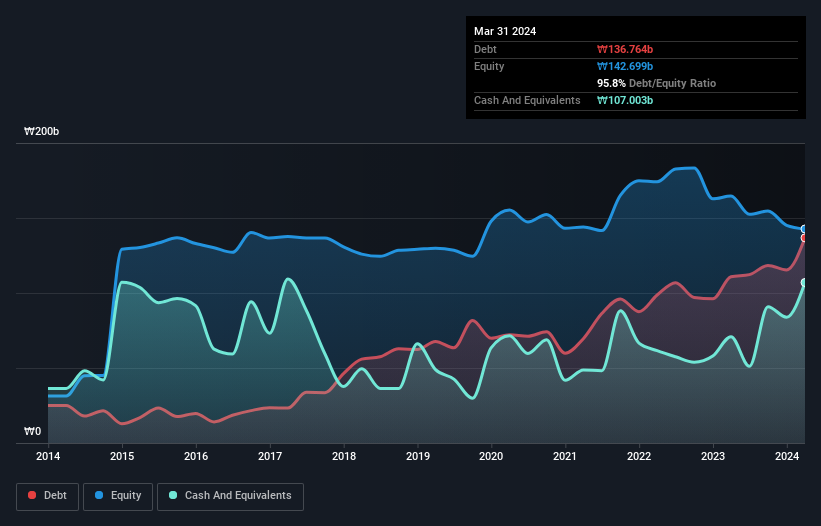- South Korea
- /
- Entertainment
- /
- KOSDAQ:A160550
Is Next Entertainment World (KOSDAQ:160550) Weighed On By Its Debt Load?
David Iben put it well when he said, 'Volatility is not a risk we care about. What we care about is avoiding the permanent loss of capital.' When we think about how risky a company is, we always like to look at its use of debt, since debt overload can lead to ruin. Importantly, Next Entertainment World Co., Ltd. (KOSDAQ:160550) does carry debt. But should shareholders be worried about its use of debt?
Why Does Debt Bring Risk?
Debt and other liabilities become risky for a business when it cannot easily fulfill those obligations, either with free cash flow or by raising capital at an attractive price. In the worst case scenario, a company can go bankrupt if it cannot pay its creditors. However, a more usual (but still expensive) situation is where a company must dilute shareholders at a cheap share price simply to get debt under control. Having said that, the most common situation is where a company manages its debt reasonably well - and to its own advantage. The first thing to do when considering how much debt a business uses is to look at its cash and debt together.
View our latest analysis for Next Entertainment World
What Is Next Entertainment World's Debt?
You can click the graphic below for the historical numbers, but it shows that as of March 2024 Next Entertainment World had ₩136.8b of debt, an increase on ₩110.8b, over one year. On the flip side, it has ₩107.0b in cash leading to net debt of about ₩29.8b.

A Look At Next Entertainment World's Liabilities
We can see from the most recent balance sheet that Next Entertainment World had liabilities of ₩184.7b falling due within a year, and liabilities of ₩16.1b due beyond that. On the other hand, it had cash of ₩107.0b and ₩22.8b worth of receivables due within a year. So its liabilities total ₩71.0b more than the combination of its cash and short-term receivables.
This is a mountain of leverage relative to its market capitalization of ₩74.1b. Should its lenders demand that it shore up the balance sheet, shareholders would likely face severe dilution. When analysing debt levels, the balance sheet is the obvious place to start. But you can't view debt in total isolation; since Next Entertainment World will need earnings to service that debt. So when considering debt, it's definitely worth looking at the earnings trend. Click here for an interactive snapshot.
Over 12 months, Next Entertainment World made a loss at the EBIT level, and saw its revenue drop to ₩117b, which is a fall of 23%. To be frank that doesn't bode well.
Caveat Emptor
While Next Entertainment World's falling revenue is about as heartwarming as a wet blanket, arguably its earnings before interest and tax (EBIT) loss is even less appealing. To be specific the EBIT loss came in at ₩6.8b. When we look at that and recall the liabilities on its balance sheet, relative to cash, it seems unwise to us for the company to have any debt. So we think its balance sheet is a little strained, though not beyond repair. For example, we would not want to see a repeat of last year's loss of ₩11b. In the meantime, we consider the stock very risky. The balance sheet is clearly the area to focus on when you are analysing debt. But ultimately, every company can contain risks that exist outside of the balance sheet. Be aware that Next Entertainment World is showing 1 warning sign in our investment analysis , you should know about...
Of course, if you're the type of investor who prefers buying stocks without the burden of debt, then don't hesitate to discover our exclusive list of net cash growth stocks, today.
Valuation is complex, but we're here to simplify it.
Discover if Next Entertainment World might be undervalued or overvalued with our detailed analysis, featuring fair value estimates, potential risks, dividends, insider trades, and its financial condition.
Access Free AnalysisHave feedback on this article? Concerned about the content? Get in touch with us directly. Alternatively, email editorial-team (at) simplywallst.com.
This article by Simply Wall St is general in nature. We provide commentary based on historical data and analyst forecasts only using an unbiased methodology and our articles are not intended to be financial advice. It does not constitute a recommendation to buy or sell any stock, and does not take account of your objectives, or your financial situation. We aim to bring you long-term focused analysis driven by fundamental data. Note that our analysis may not factor in the latest price-sensitive company announcements or qualitative material. Simply Wall St has no position in any stocks mentioned.
About KOSDAQ:A160550
Next Entertainment World
Operates as a content investment and distribution company in South Korea.
Excellent balance sheet with low risk.
Market Insights
Community Narratives



